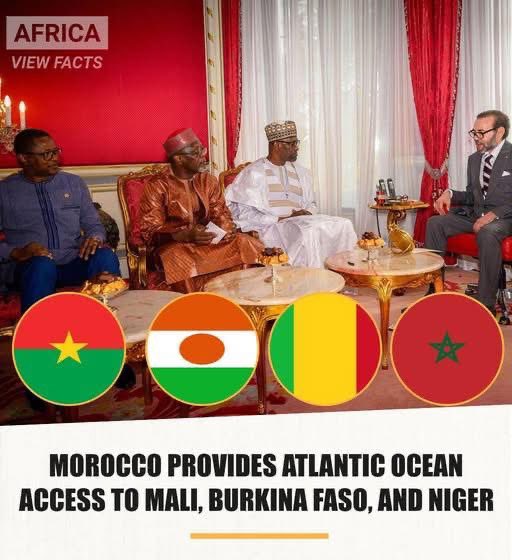
Just In: Morocco Provides Atlantic Ocean Access to Mali, Burkina Faso, and Niger: A Game-Changing Trade Initiative

In a significant development for West African geopolitics, Morocco has extended a lifeline to three landlocked Sahel nations—Mali, Burkina Faso, and Niger—by granting them access to the Atlantic Ocean through its ports.
This trade initiative, first announced in November 2023, aims to alleviate the economic pressures faced by these countries following their exit from the Economic Community of West African States (ECOWAS).
The foreign ministers of Mali, Burkina Faso, and Niger officially endorsed the plan during a diplomatic meeting on April 28, 2025, signaling a new chapter in regional cooperation.
This move not only reshapes trade dynamics but also underscores Morocco’s growing influence in West Africa amid shifting alliances and regional tensions.
The image shared in the X post by
@Joe__Bassey captures a high-level meeting involving representatives from Ghana, Niger, Mali, Burkina Faso, and Morocco.
The setting is formal, with the delegates seated in an ornate room, possibly within a Moroccan government building, as indicated by the red and gold decor.
The flags of the four nations—Ghana, Niger, Mali, Burkina Faso, and Morocco—are prominently displayed at the bottom of the image, symbolizing the collaborative effort.
The text overlay, “Morocco Provides Atlantic Ocean Access to Mali, Burkina Faso, and Niger,” credited to Africa View Facts, emphasizes the core message of the initiative.
This visual representation highlights the diplomatic significance of the agreement, which seeks to provide these landlocked countries with a crucial gateway to international markets.
The backdrop of this initiative is rooted in the political upheaval in the Sahel region. Mali, Burkina Faso, and Niger, all under military juntas following coups between 2020 and 2023, announced their departure from ECOWAS in 2024.
They formed the Alliance of Sahel States, severing ties with traditional Western partners like France and the United States, and instead sought military support from Russia.
ECOWAS responded with stringent trade sanctions, severely limiting these nations’ access to coastal ports for imports and exports.
Morocco, seizing the opportunity to expand its regional influence, stepped in with this trade access proposal.
By offering its Atlantic ports, Morocco not only provides an economic lifeline but also positions itself as a key player in West African affairs, potentially countering the influence of its rival, Algeria, which has strained relations with the Sahel states.
However, the initiative has sparked mixed reactions, as reflected in the replies to the X post.
Some users expressed skepticism about Morocco’s intentions, pointing to its diplomatic ties with Israel, formalized in 2020 through the Abraham Accords.
Morocco’s relationship with Saudi Arabia, a staunch U.S. ally, also raised concerns among those wary of Western influence in the region.
One user cautioned against trusting Morocco fully, citing its historical ambition to align more closely with the European Union rather than African unity.
Others highlighted Morocco’s ongoing conflict over Western Sahara, where it faces opposition from the Polisario Front, supported by Algeria.
These comments reflect broader geopolitical tensions, including the Sahel states’ pivot toward Russia and the complex dynamics of North African rivalries.
Despite the skepticism, the initiative holds significant potential for Mali, Burkina Faso, and Niger.
Access to Moroccan ports could mitigate the economic fallout from ECOWAS sanctions, allowing these nations to import essential goods and export commodities like uranium (from Niger) and gold (from Mali and Burkina Faso).
For Morocco, the move strengthens its economic ties with the Sahel and enhances its strategic position in West Africa.
However, the success of this arrangement will depend on navigating the region’s intricate political landscape, including managing relations with ECOWAS member states like Ghana, which also has a stake in regional stability.
This trade access deal marks a pivotal moment in West African geopolitics, with Morocco emerging as a key facilitator of economic connectivity.
While the initiative promises to bolster the economies of Mali, Burkina Faso, and Niger, the underlying tensions and geopolitical rivalries suggest that its implementation will require careful diplomacy.
As the Sahel region continues to grapple with security challenges and political transitions, Morocco’s role in providing Atlantic access could either foster greater regional cooperation or deepen existing divides.


